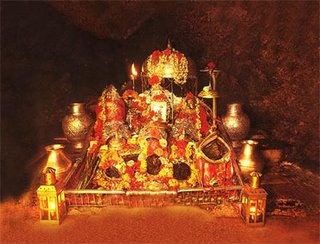
Navratras, or navratris, or nau-ratri - various names in which Hindus celebrate this festival worshipping the nine - roops or forms of Godddess Durga, is beginning 23rd day of September this year.
So, here's wishing you all Very Shubh Navratras!!!!!
Celebrated all over North India as Navratras, this festival is also the main festival of the Bengalis - and is known as the Durga Puja.
The ten -day long celebration also coincides with the manchan of the Ramlila - that is, the depiction of the story of the Ramayana - of Lord Rama, Ma Sita, and Laxman - of their vanvas, i.e. exile for 14 years from Ayodhya; their stay in the various forests spannig entire India, various encounters with demons (rakhshasaz), kidnapping of Ma Sita, meeting with Hanuman, burning of Lanka..., and D fight with all the biggest demons of that age, and finally the victory of good over evil as they say.
This victory is celebrated as Deepawali - the festival of lights - wow! that's the beauty of India - one festival connects to another, and blends so beautifully as a story.
Okay, so getting back to the nine-day festival, and not diverting -in the present text- to the 365-days celebrations in India, I'll start with the significance of each day in the 9-day festival.

The 9 days, each kinda belong to 9 roops of Goddess Durga, and can be summarized in this small poem I 've been hearing since childhood - and used to sing along-with mom:
Pratham Shailputri kehlave,
Doosri Brahmacharini man bhave,
Teesri Chandrghanta shubhnaam,
Chauthi Kushmanda Sukhdham;
Panchvi devi Skandmata,
Shashthi Katyayani Vikhyata,
Satvi Kalratri mahamaya,
Aathvi Mahagauri jagjaya;
Nauvi Siddhidatri jagjaane,
Navdurga ke naam bakhane :)
Okhay! so here's the translation:
The First of the nine forms of goddess durga is called Shailputri - that is daughter of shail - or rather daughter of the king of mountains (Himalayas).
The second of the 9 forms is Brahmacharini, or the one who follows Brahma, i.e. Godess Saraswati - the store house of knowledge :)
Devi Chandraghanta is te third deity and is known to scare the demons/ enemies by the resounding sound of the ghanta/ the bell.
Devi Kushmanda is the celestial supreme worshipped on the fourth day, and holds the kumbha containing the cosmic vivacity, represents the cosmic intricacies, and emanates a solar-like aura.
Next in line is the Goddess Skandamata, is represented as the mother of Lord Skanda, holding Him in her lap- and represents as the Holy mother of all. With her defending and granting gestures, even an idiot gains knowledge.
Okay, so next is Goddess Katyayani - the goddess worshipped on the 6th day of the Navratras - it is this day that the main festivity begins in Bengal - and is known as Shashthi poojan [Shashthi means 6th day] - the Goddess is known to bestow good fortunes on her devotees.
The next one - worshipped on the 7th day, or Saptami is Goddess Kalratri -and is known as she has a dark complexion - and is as dark as the night [kal symbolises death, and ratri is night] - so the lovely beautiful Goddess took this form to scare off the demons - you see there's a famous saying in Hindi - "laato ke bhoot baato se nahi maante" - which means that if some one doesn't listen to you by your being polite, then the same one should be made to understand with force/ scare him /her off.
This goddess is seen to wear garlands made of khopris [skulls] - showing how many demons she killed , and the rest of them beware, if they do not want to land up being ruth-lessly killed!
The next one is Mahagauri - or Ma Parvati. Its said that the Goddess Kali is the consortof Lord Shiva, and had a dark complexion - and Lord Shiva used to tease Her, and call Her "Kali", so She gained this awesome beautiful "Gaur" varn [colour] by Her tapa /tapasya and hence is called MahaGauri. Peace and compassion radiate from Her being.
The last day of the navratras - the nineth day is spentin thanks-giving to Goddess Siddhidatri- ensconced on a lovely lotus, who, as the name suggests, bestows the devotees with all kinds Siddhis. It is believed that the Goddess grants Her devotees all that desire on the 9th day.
Besides this, it is also believed that [the same was confirmed by a [seemingly] well-read panditji [Indian priest] of a well known temple on television today], that the Navratri, or the festival of 9 nights, can be divided into 3 parts of 3 days each, each devoted to Ma Lakshmi - the Goddess of Wealth, Goddess Saraswati - the Goddess of Knowledge and wisdom, and Goddess Parvati - the Goddess of Valour.
Hmmmm.....so for today, this was in brief about the nine days , and the 9 forms of the Goddess Durga, or Shakti as celebrated during Navratras.
I'll write in about kanjakas, or kanya poojan in the next post ....
Till den keep smiling.....and chanting...... "Jai Mata Di" :)

Comments
Post a Comment
Thanks 4 ur comments:) Looking forward 2 more thoughts:)